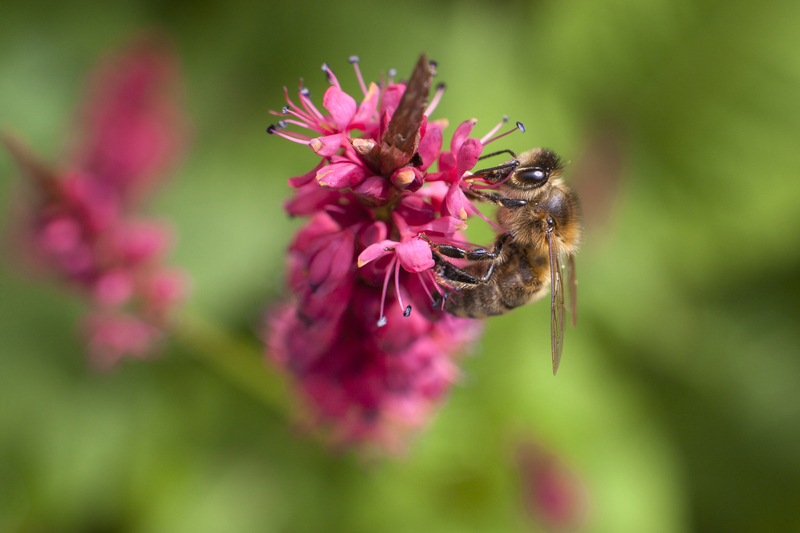Organic Waste: The Path to Soil Fertility
Posted on 13/06/2025
Organic Waste: The Path to Soil Fertility
Organic waste--once considered little more than an inconvenience--is now recognized as a crucial element in the cycle of life and crop productivity. Embracing sustainable practices that recycle organic matter has proven to be fundamental for nurturing soil health, preserving natural resources, and cultivating abundant harvests. In this comprehensive article, we will explore how harnessing organic waste paves the way for optimal soil fertility, boosts plant growth, and greatly enhances the resilience of farming systems.
What is Organic Waste?
Simply put, organic waste refers to any material that originates from living organisms and is biodegradable. This includes:
- Food scraps from kitchens and restaurants
- Yard trimmings, grass clippings, and leaves
- Animal manure and bedding
- Agricultural residues (such as crop stalks and husks)
- Pulp and paper products of plant origin
These materials are in stark contrast to inorganic waste, which comprises non-degradable materials like plastics and metals. When managed properly, organic residues serve as a powerful resource, breathing life back into soils and igniting a natural cycle of fertility.

The Connection Between Organic Matter and Soil Fertility
Soil fertility refers to the soil's ability to sustain plant growth by supplying essential nutrients, water, and a healthy structure for root development. Central to this is the presence of organic matter, which plays several vital roles:
- Nutrient Supply: Organic waste decomposes and releases macronutrients (like nitrogen, phosphorus, and potassium) and micronutrients, vital for healthy plants.
- Soil Structure Improvement: The addition of humus (fully decomposed organic material) helps bind soil particles, improving aeration, water infiltration, and root penetration.
- Boosting Biological Activity: Organic material provides food for earthworms, fungi, and beneficial bacteria, which aid nutrient cycling and disease suppression.
- Water Retention: Soils rich in organic matter have a greater capacity to retain moisture, reducing the need for frequent irrigation.
In essence, organic waste recycling transforms what would otherwise be environmental burdens into invaluable agents of soil restoration and agricultural productivity.
Benefits of Replenishing Soils with Organic Waste
Utilizing organic waste products not only addresses waste management challenges but also delivers a multitude of benefits to the soil ecosystem and wider environment:
1. Reducing Chemical Dependency
Intensive agriculture has led to the overuse of synthetic fertilizers, which disrupt soil health and contaminate water sources. Incorporating composted organic waste offers a slow-release, biologically active alternative, minimizing the need for artificial inputs.
2. Enhancing Plant Resilience
Healthier, humus-rich soils nurture robust plants with stronger natural resistance to pests, diseases, and drought stress. This builds resilience against the challenges of climate change and unpredictable weather.
3. Sequestering Carbon and Addressing Climate Change
Organic matter in soil acts as a carbon sink, trapping CO2 and reducing greenhouse gas concentrations in the atmosphere. Thus, recycling organic residues not only boosts soil fertility but also plays a significant role in mitigating climate change.
4. Enriching Soil Biodiversity
Decomposing plant and animal material fuels a web of life underground, from microbes and arthropods to earthworms and fungi. This biodiversity is essential for soil health and nutrient turnover.
5. Reducing Landfill Pressure
Diverting kitchen scraps and green waste from landfills helps reduce methane emissions and frees up valuable landfill space, creating a win-win for agriculture and the environment.
Methods of Transforming Organic Waste into Soil Fertility
There are several proven methods for converting organic refuse into forms that enrich soil quality and fertility.
Composting
Composting is the controlled decomposition of organic matter in the presence of oxygen. During composting, microorganisms break down materials like food scraps, leaves, and manure into a nutrient-dense, crumbly substance called compost. Composting can be accomplished using several techniques:
- Backyard Composting: Simple piles or bins turn kitchen and garden waste into mature compost over several months.
- Vermicomposting: The use of earthworms (such as red wrigglers) to digest organic material and produce worm castings, a highly fertile amendment for gardens and potted plants.
- Industrial/Commercial Composting: Large-scale facilities process municipal organic waste in windrows or aerated static piles, handling greater volumes with faster turnaround times.
Successful composting requires balancing carbon-rich (browns) and nitrogen-rich (greens) materials, aeration, and moisture to support microbial activity.
Vermicomposting: Earthworms at Work
Earthworms are nature's soil engineers. In vermicomposting, worms consume organic residues and excrete nutrient-rich castings or vermicompost, loaded with beneficial microorganisms and growth hormones. This process is especially valuable for urban dwellers and small-scale gardeners seeking to enhance soil vitality in limited spaces.
Bokashi Fermentation
Bokashi composting is a type of anaerobic fermentation that utilizes specific microbes (lactic acid bacteria and yeasts) to break down kitchen waste, including meats and dairy, that traditional composting methods typically cannot handle. The fermented matter is then buried in the soil, where it completes decomposition, feeding plant roots directly.
Green Manuring
A green manure is a cover crop grown specifically to be incorporated back into the soil while still green, enriching it with fresh organic matter. Common green manures include clover, vetch, alfalfa, and certain grasses. They:
- Add large amounts of biomass that rapidly decompose
- Fix atmospheric nitrogen (legumes only) for subsequent crops
- Prevent soil erosion and weed encroachment between main crops
Mulching
Spreading organic mulches (such as straw, shredded leaves, or grass clippings) around crops or garden beds helps regulate temperature, conserve moisture, suppress weeds, and gradually incorporate nutrients into the topsoil as the mulch decomposes.
Direct Incorporation
In some cases, raw organic waste--such as crop residues or manure--are added directly to the soil and allowed to decompose in situ. While effective, this method requires careful management to avoid temporary nitrogen lock-up or odors.
Best Practices for Using Organic Waste for Soil Fertility
To fully realize the benefits of organic waste management in agriculture, certain guidelines ensure safety, efficiency, and maximum soil enrichment:
- Avoid Diseased or Chemically Treated Materials: When using post-harvest residues or yard waste, ensure they are free of persistent pesticides, herbicides, or plant diseases.
- Balance Nutrient Contents: An ideal compost blend contains a mix of 'greens' (nitrogen-rich) and 'browns' (carbon-rich) for optimal microbial breakdown.
- Monitor Moisture and Aeration: For successful composting, keep moisture levels akin to a wrung-out sponge and turn the pile frequently to supply oxygen.
- Avoid Over-application: Excessive quantities of uncomposted waste may lead to nutrient imbalances or phytotoxic effects.
- Proper Timing: Apply compost or organic soil amendments before planting or during crop establishment to maximize nutrient availability.
Real World Success: Organic Waste and Soil Fertility Around the Globe
Numerous communities and nations have embraced organic waste recycling for soil enrichment with impressive outcomes:
- India: Many smallholder farms use composted crop residues and cow dung to restore soil fertility, raising yields and minimizing costs.
- China: Large-scale composting initiatives process vast quantities of food and agricultural wastes, simultaneously reducing environmental pollution and boosting sustainable food production.
- Europe and North America: Government-supported green waste collection and municipal composting schemes turn urban organic refuse into valuable soil conditioners for agriculture and landscaping.
- Urban Community Gardens: Across cities worldwide, residents divert kitchen and yard waste to fuel productive urban gardens, increasing local food resilience and reducing waste management strains.
Challenges and Drawbacks of Organic Waste Management
Despite the many benefits, managing organic residues for soil improvement is not without obstacles:
- Contamination Risk: Mixed waste streams can introduce plastics or hazardous materials, requiring vigilant sorting and education.
- Pathogens and Weeds: Inadequate composting may not fully destroy weed seeds or harmful microorganisms, posing risks to crops and human health.
- Labor and Infrastructure: Establishing community-scale composting or collection systems demands upfront investment, organization, and ongoing public participation.
- Slow Nutrient Release: Unlike synthetic fertilizers, nutrients from organic matter are made available gradually, necessitating careful planning to meet crop demands.
Organic Waste: The Future of Sustainable Soil Fertility
With mounting pressure to overcome soil degradation, climate change, and food security challenges, the shift toward regenerating soils with organic waste is more important than ever. Here are a few predictions for the road ahead:
- Advances in Biotechnology: Improved composting techniques, specialized microbes, and digital monitoring systems will streamline waste transformation and soil health assessment.
- Policy Support: Legislation encouraging waste diversion and organic soil amendment adoption will become critical components of sustainable agricultural frameworks.
- Public Awareness: Ongoing education on the importance of soil health and organic waste utilization will foster greater community participation at all levels.

How to Start Your Own Organic Waste-to-Soil Project
- Assess Your Waste Stream: Identify sources of food scraps, yard waste, or agricultural residues available in your home, school, or workplace.
- Choose the Best Method: For homes, backyard composting or vermicomposting work well; for farms or communities, consider composting windrows or partnering with municipal waste processors.
- Set Up Your System: Build a compost bin or designate a corner of your garden for a pile. Ensure proper balance of materials and regular turning.
- Monitor and Maintain: Keep the pile moist and aerated, and avoid adding any plastics, diseased plants, or animal products unless using bokashi fermentation.
- Apply Finished Compost: When the material is dark, crumbly, and earthy-smelling, spread it onto your garden beds, lawns, or fields to give your soil--and plants--an organic boost.
Conclusion: Turning Waste into Wealth for Healthy Soils
The journey from organic waste to thriving, fertile soils is a powerful testament to the capacity for regeneration in nature, when nurtured by mindful human action. Whether you are a backyard gardener, commercial farmer, or urban resident, the simple act of recycling organic residues into the earth leads to healthier food, hardier ecosystems, and a more sustainable future. By adopting organic waste management techniques for soil fertility, we not only solve waste problems--but also unlock nature's extraordinary potential to feed future generations.
Let organic waste be the foundation of your path to vibrant, living soil--a gift that keeps on giving for people and planet alike.

